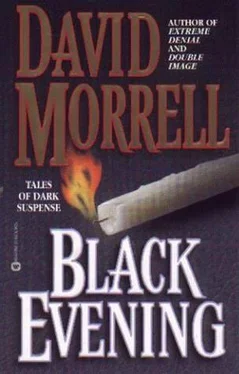David Morrell - Black Evening
Здесь есть возможность читать онлайн «David Morrell - Black Evening» весь текст электронной книги совершенно бесплатно (целиком полную версию без сокращений). В некоторых случаях можно слушать аудио, скачать через торрент в формате fb2 и присутствует краткое содержание. Жанр: Ужасы и Мистика, на английском языке. Описание произведения, (предисловие) а так же отзывы посетителей доступны на портале библиотеки ЛибКат.
- Название:Black Evening
- Автор:
- Жанр:
- Год:неизвестен
- ISBN:нет данных
- Рейтинг книги:4 / 5. Голосов: 1
-
Избранное:Добавить в избранное
- Отзывы:
-
Ваша оценка:
- 80
- 1
- 2
- 3
- 4
- 5
Black Evening: краткое содержание, описание и аннотация
Предлагаем к чтению аннотацию, описание, краткое содержание или предисловие (зависит от того, что написал сам автор книги «Black Evening»). Если вы не нашли необходимую информацию о книге — напишите в комментариях, мы постараемся отыскать её.
Black Evening — читать онлайн бесплатно полную книгу (весь текст) целиком
Ниже представлен текст книги, разбитый по страницам. Система сохранения места последней прочитанной страницы, позволяет с удобством читать онлайн бесплатно книгу «Black Evening», без необходимости каждый раз заново искать на чём Вы остановились. Поставьте закладку, и сможете в любой момент перейти на страницу, на которой закончили чтение.
Интервал:
Закладка:
I scowled at the prints I'd been stacking. Many still surrounded me – on the walls, the floor, the bed, the windows, even the ceiling. A swirl of colors. A vortex of brilliance.
Or at least I once had thought of them as brilliant. But now, with the insight Myers had given me, with the vision I'd gained in the Metropolitan Museum, I saw behind the sun-drenched cypresses and hayfields, the orchards and meadows, toward their secret darkness, toward the minuscule, twisted arms and gaping mouths, the black dots of tortured eyes, the blue knots of writhing bodies. ("Blue is for insanity," Myers had said.)
All it took was a slight shift of perception, and there weren't any orchards and hayfields, only a terrifying gestalt of souls in hell. Van Dorn had indeed invented a new stage of Impressionism. He'd impressed upon the splendor of God's creation the teeming images of his own disgust. His paintings didn't glorify. They abhorred. Everywhere Van Dorn had looked, he'd seen his own private nightmare. Blue was for insanity, indeed, and if you fixated on Van Dorn's insanity long enough, you, too, became insane. ("Don't look ever again, I beg you, at Van Dorn's paintings," Myers had said in his letter.) In the last stages of his breakdown, had Myers somehow become lucid enough to try to warn me? ("Can't stand the pain. Need a break. Going home.") In a way I'd never expected, he had indeed gone home.
Another startling thought occurred to me. ("The critics who devoted themselves to analyzing Van Dorn. They each tried to paint in Van Dorn's style," Myers had said a year ago.) As if attracted by a magnet, my gaze swung across the welter of prints and focused on the corner across from me, where two canvas originals leaned against the wall. I shivered, stood, and haltingly approached them.
They'd been painted by an amateur. Myers was an art historian , after all. The colors were clumsily applied, especially the splotches of orange and blue. The cypresses were crude. At their bases, the rocks looked like cartoons. The sky needed texture. But I knew what the black dots among them were meant to suggest. I understood the purpose of the tiny blue gashes. The miniature, anguished faces and twisted limbs were implied, even if Myers had lacked the talent to depict them. He'd contracted Van Dorn's madness. All that had remained were the terminal stages.
I sighed from the pit of my soul. As the village's church bell rang, I prayed that my friend had found peace.
It was dark when I left the hotel. I needed to walk, to escape the greater darkness of that room, to feel at liberty, to think. But my footsteps and inquiries led me down a narrow cobbled street toward the village's clinic, where Myers had finished what he had started in Van Dorn's room. I asked at the desk and five minutes later introduced myself to an attractive, dark-haired, thirtyish woman.
The nurse's English was more than adequate. She said her name was Clarisse.
"You took care of my friend," I said. "You sent me the letter he dictated and added a note of your own."
She nodded. "He worried me. He was so distressed."
The fluorescent lights in the vestibule hummed. We sat on a bench.
"I'm trying to understand why he killed himself," I said. "I think I know, but I'd like your opinion."
Her eyes, a bright, intelligent hazel, suddenly were guarded. "He stayed too long in his room. He studied too much." She shook her head and stared toward the floor. "The mind can be a trap. It can be a torture."
"But he was excited when he came here?"
"Yes."
"Despite his studies, he behaved as if he'd come on vacation?"
"Very much."
"Then what made him change? My friend was unusual, I agree. What we call high-strung. But he enjoyed doing research. He might have looked sick from too much work, but he thrived on learning. His body was nothing, but his mind was brilliant. What tipped the balance, Clarisse?"
"Tipped the…?"
"Made him depressed instead of excited. What did he learn that made him – "
She stood and looked at her watch. "Forgive me. I stopped work twenty minutes ago. I'm expected at a friend's."
My voice hardened. "Of course. I wouldn't want to keep you."
Outside the clinic, beneath the light at its entrance, I stared at my own watch, surprised to see that it was almost eleven-thirty. Fatigue made my knees ache. The trauma of the day had taken away my appetite, but I knew I should try to eat, and after walking back to the hotel's dining room, I ordered a chicken sandwich and a glass of Chablis. I meant to eat in my room but never got that far. Van Dorn's room and the diary beckoned.
The sandwich and wine went untasted. Sitting at the desk, surrounded by the swirling colors and hidden horrors of Van Dorn prints, I opened a notebook and tried to understand.
A knock at the door made me turn.
Again I glanced at my watch, astonished to find that hours had passed like minutes. It was almost two a.m.
The knock was repeated, gentle but insistent. The manager?
"Come in," I said in French. "The door isn't locked."
The knob turned. The door swung open.
Clarisse stepped in. Instead of her nurse's uniform, she now wore sneakers, jeans, and a sweater whose tight-fitting yellow accentuated the hazel in her eyes.
"I apologize," she said in English. "I must have seemed rude at the clinic."
"Not at all. You had an appointment. I was keeping you."
She shrugged self-consciously. "I sometimes leave the clinic so late, I don't have a chance to see my friend."
"I understand perfectly."
She drew a hand through her lush, long hair. "My friend got tired. As I walked home, passing the hotel, I saw a light up here. On the chance it might be you…"
I nodded, waiting.
I had the sense that she'd been avoiding it, but now she turned toward the room. Toward where I'd found the dried blood on the prints. "The doctor and I came as fast as we could when the manager phoned us that afternoon." Clarisse stared at the prints. "How could so much beauty cause so much pain?"
"Beauty?" I glanced toward the tiny, gaping mouths.
"You mustn't stay here. Don't make the mistake your friend did."
"Mistake?"
"You've had a long journey. You've suffered a shock. You need to rest. You'll wear yourself out as your friend did."
"I was just looking through some things of his. I'll be packing them to send them back to America."
"Do it quickly. You mustn't torture yourself by thinking about what happened here. It isn't good to surround yourself with the things that disturbed your friend. Don't intensify your grief."
"Surround myself? My friend would have said 'immerse.'"
"You look exhausted. Come." She held out her hand. "I'll take you to your room. Sleep will ease your pain. If you need some pills to help you…"
"Thanks. But a sedative won't be necessary."
Clarisse continued to offer her hand. I took it and went to the hallway.
For a moment I stared back toward the prints and the horror within the beauty. I said a silent prayer for Myers, shut off the lights, and locked the door.
We went down the hall. In my room, I sat on the bed.
"Sleep long and well," Clarisse said.
"I hope."
"You have my sympathy." She kissed my cheek.
I touched her shoulder. Her lips shifted toward my own. She leaned against me.
We sank toward the bed. In silence, we made love.
Sleep came like her kisses, softly smothering.
But in my nightmares, there were tiny, gaping mouths.
Sunlight glowed through my window. With aching eyes, I looked at my watch. Half past ten. My head hurt. Clarisse had left a note on my bureau.
Last night was sympathy. To share and ease your grief. Do what you intended. Pack your friend's belongings. Send them to America.
Читать дальшеИнтервал:
Закладка:
Похожие книги на «Black Evening»
Представляем Вашему вниманию похожие книги на «Black Evening» списком для выбора. Мы отобрали схожую по названию и смыслу литературу в надежде предоставить читателям больше вариантов отыскать новые, интересные, ещё непрочитанные произведения.
Обсуждение, отзывы о книге «Black Evening» и просто собственные мнения читателей. Оставьте ваши комментарии, напишите, что Вы думаете о произведении, его смысле или главных героях. Укажите что конкретно понравилось, а что нет, и почему Вы так считаете.












